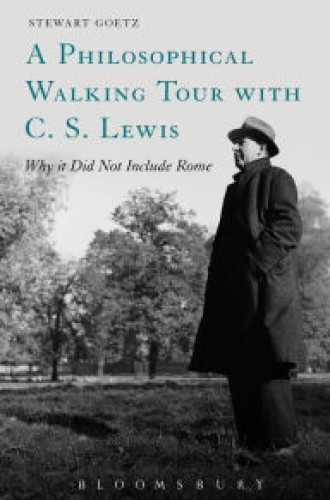A Philosophical Walking Tour with C. S. Lewis, by Stewart Goetz
Why didn’t C. S. Lewis’s religious journey end in Rome? Stewart Goetz suggests that the answer involves a theoretical quarrel with Thomas Aquinas about pleasure and the soul. It is a provocative thesis, carefully argued, but I am puzzled about why the ordinary reader of Lewis would be worried about the road not taken. On the other hand, the question does strike me as one that some Roman Catholics might ask. Catholicism often presents itself as a sort of theological geometry: no matter where you enter the system, the whole structure of practice and dogma follows with deductive finality. This theological geometry requires that if Lewis espouses Christianity at all, the Catholic system will follow necessarily.
Lewis experienced Catholic systematization at Oxford in the form of a version of neoscholasticism at the Dominican priory of Blackfriars. According to the evidence in Goetz’s account, he found Catholic necessitarianism quite uncongenial (as I do, even though I am a Roman Catholic). He wrote to one correspondent: “I repudiate their practice of defining and systematizing and continually enumerating a list of things that must be accepted.” Deductive Catholicism led to what Lewis called add-ons: doctrines such as the Assumption of Mary to which there is little or no reference in biblical testimony. His most influential book was titled Mere Christianity for good reason.
Read our latest issue or browse back issues.
Goetz puts great store in Lewis’s commitment to common sense, which would mark a sharp difference between mere Christianity and the metaphysical complexities of Aquinas’s Summa. Lewis regarded the church’s official promotion of Aquinas as just another Catholic add-on. He claimed that it is common sense that all pleasure is essentially, intrinsically good. But aren’t there bad, illicit, or sinful pleasures? Lewis thinks not. An act may be sinful, but the pleasure it elicits is simply pleasure, and pleasures are what we go for. Fornication is wrong, but sexual pleasure, like all pleasure, is good. Lewis held that the essential good of pleasure and the essential evil of pain are part of the Christian doctrines of heaven (a place of infinite pleasure) and hell (a place of infinite pain).
There is a commonsense ring to the notion that pleasure is an intrinsic good. However, pleasure is one of the trickiest words in our moral vocabulary. If one looks at its common usage, Lewis’s common sense does not appear all that common. Gilbert Ryle, an “ordinary language” philosopher, points out that “we all know how to conduct our every day . . . business with the verbs like ‘enjoy,’ ‘dislike,’ ‘hurt’; and yet we don’t know how to conduct our business with such abstract nouns as ‘pleasure,’ ‘aversion,’ and ‘pain.’” Lewis’s dichotomy of pleasure and pain is not simple common sense; instead it seems to be a broad theory of human motivation like Jeremy Bentham’s hedonistic calculus. Pleasure and pain are correlated opposites like hot and cold—thus the clear distinction between heaven (pleasure) and hell (pain). In ordinary language usage, however, pleasure and pain do not behave as opposites. To take just one instance: pain language is often specific to place and time, but pleasure language is not. Where does it hurt? we ask. How long did the pain last? But we seldom ask where the pleasure is or how long it lasted.
For Lewis, pleasure and pain explain our conduct. Actions are instrumental for achieving an intrinsic good; they are the means to the end of acquiring pleasure or avoiding pain. Goetz sums up Lewis’s position: “If knowledge, music, and beauty are good, . . . they are so only because they are instrumental to pleasure.” But the problem with any instrumental theory of action is the relation between means and ends. Is the relation external or internal? If the instrument is external, then any means will do if it achieves the end. I may get the same sexual pleasure licitly or illicitly. On the other hand, if the means-ends relation is internal, then the pleasure is embedded in the means. I love Mahler’s ninth symphony, but it’s awfully long. I wish that I could get the pleasure without the tedium of listening.
Recognizing the internal or external relation of means and ends is critical to understanding Lewis’s presumed conflict with Aquinas. Like Lewis, Aquinas viewed pleasure as an intrinsic good in the sense that it is not instrumental to some further good. However, he did not think that pleasure as a generic category can be the payoff for actions. The pleasure of moral good is internal to the action. Illicit sex yields bad pleasure. The basic reason for Aquinas’s objection is that the good life consists in activity: in putting to use the moral, artistic, and intellectual skills that are under our control. The good life aims at happiness, at activity that is in accordance with the virtues. If the virtues pay off in pleasure beyond the pleasure of being virtuous, that is good luck—or a gift of the gods.
Common sense may help support Lewis’s view of pleasure, but it seems an unlikely approach to a discussion of the soul. Goetz argues that Lewis is a Cartesian, holding that there is a clear separation between the external body and the inner soul or person. Aquinas denied such a separation. For him, the soul is the proper activity of the biological body. The question of body and soul has a history going back to Plato, and it has been an obsession in philosophy from Descartes to the latest controversy over artificial intelligence. Goetz’s account of the presumed argument between Lewis and Aquinas illustrates the paradoxes and problems of a very thorny issue.
The quarrel between Lewis and Aquinas over the soul could be regarded as a contest between common Christian language and common sense. It is very common for Christians to talk about the soul as if it were a separate entity. It is the soul that God judges, and it is the soul that is reunited with body at the general resurrection. On the other hand, common sense sounds more like Aquinas: the soul is just the body alive. Lewis’s and Aquinas’s differing views on the soul/body distinction emerge sharply in the Christian problem of the resurrection body. Goetz offers an extended discussion of that conundrum.
The various conflicts between Lewis and Aquinas suggested by Goetz are intrinsically interesting. Evaluating them as a philosopher, I would have to give Aquinas the nod. At the same time, I don’t think such a judgment would be fair to Lewis. Lewis was well trained in formal philosophy. He read philosophy as an undergraduate, and his first academic position at Oxford was in philosophy. For all that, he did not write philosophically. His best works are sermons: exercises in Christian rhetoric full of illuminating metaphors and narratives to energize the faith. There is common sense to pleasure as an intrinsic good if you mean to deny gloomy Christian asceticism. Heaven as infinite pleasure sounds attractive. If one finally gives the palm to Lewis over Aquinas, one might adapt the words of Petrarch about Aristotle: “[Aquinas] teaches what virtue is, I do not deny that, but [unlike Lewis ] his lesson lacks words that sting and set fire and urge toward love of virtue and hatred of vice.”






